Below is a selection of past, exclusive CREATE Training in Global Biomedical Technology Research and Innovation training sessions.
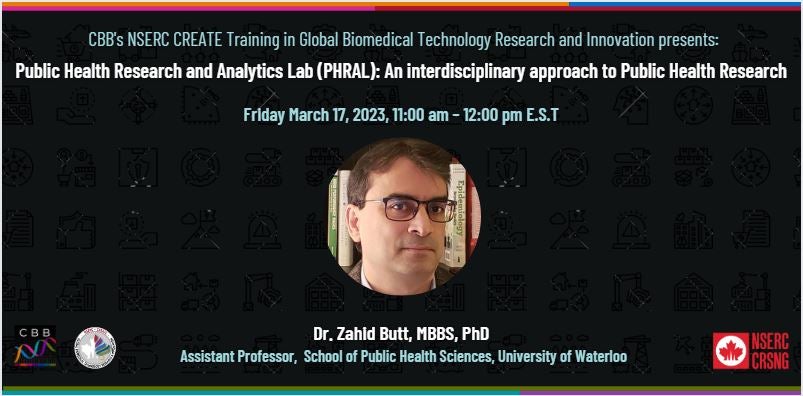
Public Health Research and Analytics Lab (PHRAL): An interdisciplinary approach to Public Health Research - Faciliatted by Professor Zahid Butt, School of Public Health Sciences, University of Waterloo
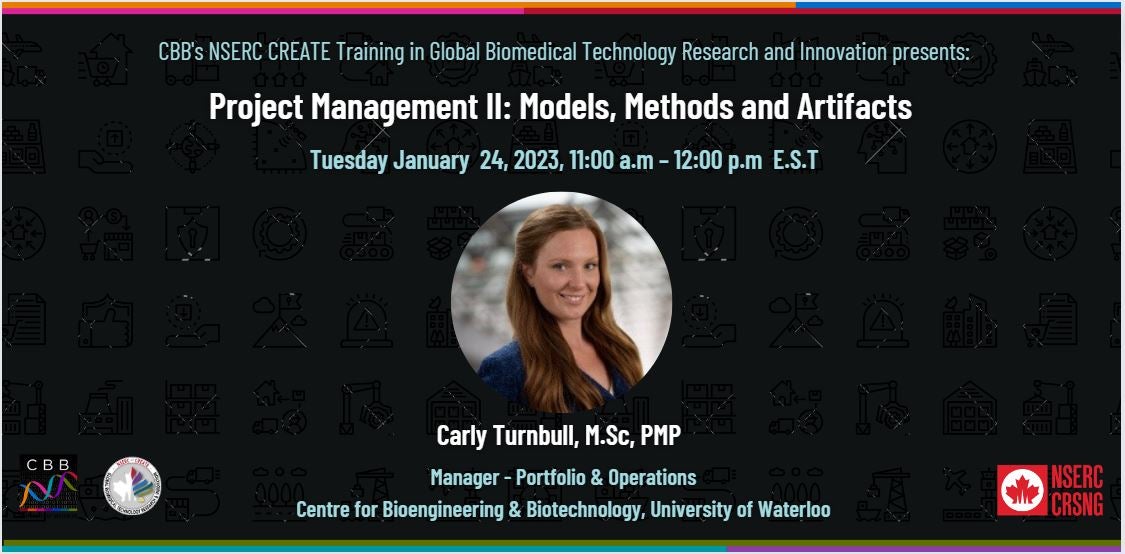
Project Management II: Models, Methods and Artifacts – Facilitated by Carly Turnbull, M.Sc., Project Management Professional (PMP), Manager - Portfolio & Operations, The Centre for Bioengineering & Biotechnology, University of Waterloo.
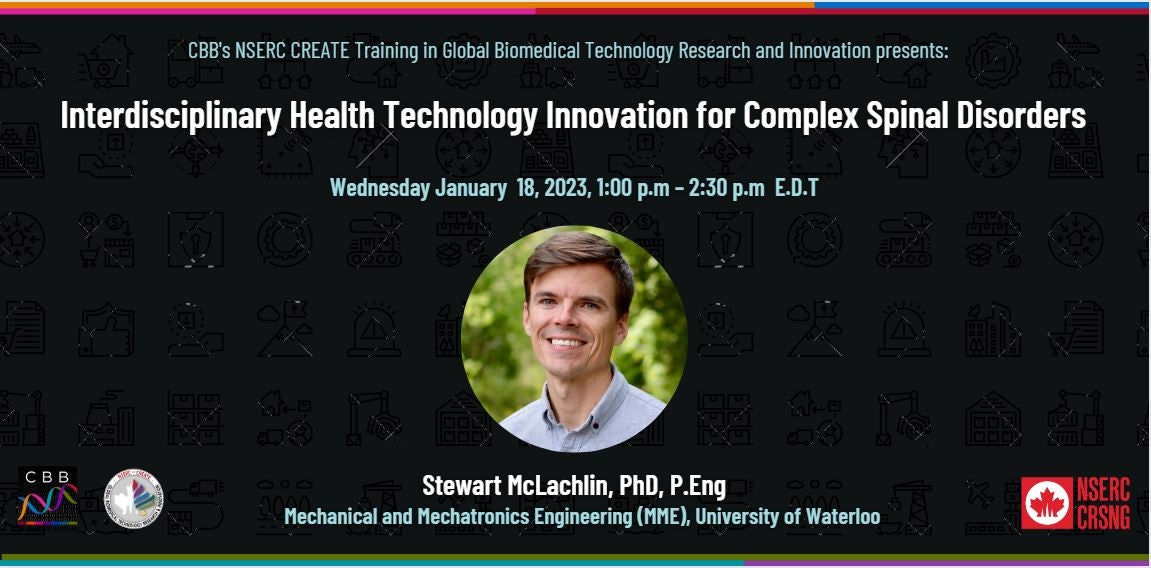
CBB CREATE Exclusive Lecture and Tour of the Robohub: Interdisciplinary Health Technology Innovation for Complex Spinal Disorders - Facilitated by Professor Stewart McLachlin, P.hD., P.Eng., Assistant Professor in the Department of Mechanical and Mechatronics Engineering (MME) and the Principal Investigator of the Orthopaedic Mechatronics (OrthoTron) Laboratory at the University of Waterloo.
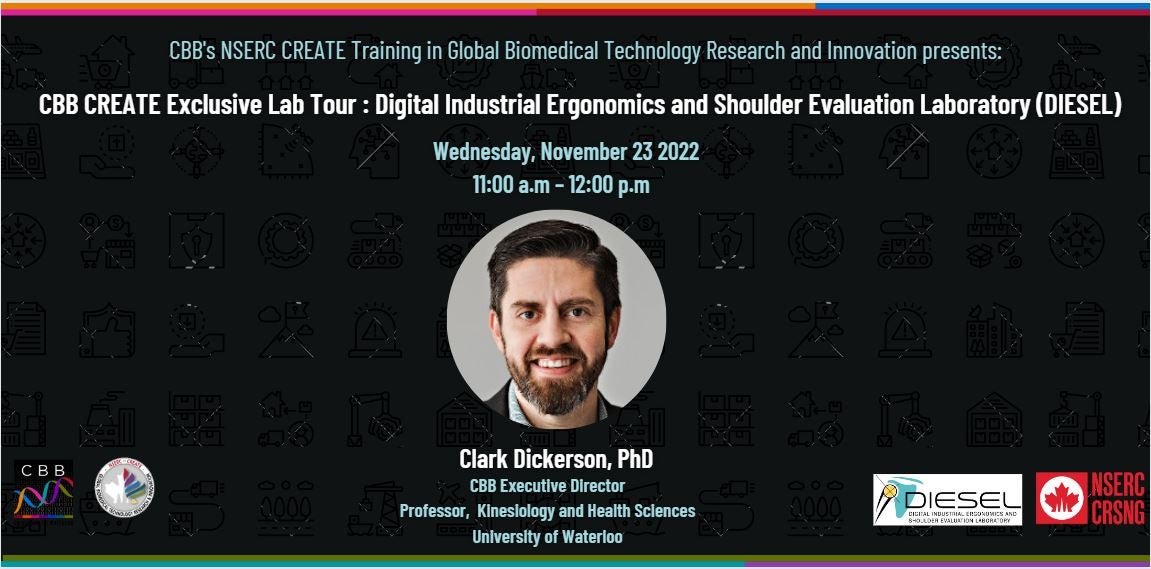
Tour of the Digital Industrial Ergonomics and Shoulder Evaluation Laboratory (DIESEL)– Facilitated by Professor Clark Dickerson, PhD - CBB CREATE co-grantee, CBB Executive Director, Canada Research Chair in Shoulder Mechanics, and Professor in the Department of Kinesiology and Health Sciences, University of Waterloo. Research in the Digital Industrial Ergonomics and Shoulder Evaluation Laboratory (DIESEL) is focused on the study of shoulder mechanics with the goal of generating novel, useful information regarding shoulder function and dysfunction and to apply this information to practical applications across a range of human activities where appropriate. In this lab tour, Professor Dickerson and his research term at DIESEL will outline some of their new innovations that could positively impact musculoskeletal shoulder health through improved understanding, prevention, identification, treatment, rehabilitation, and accommodation of shoulder disorders. [Module 3. Biomedical Commercialization; Innovation and Challenges in Biomedical Technologies].
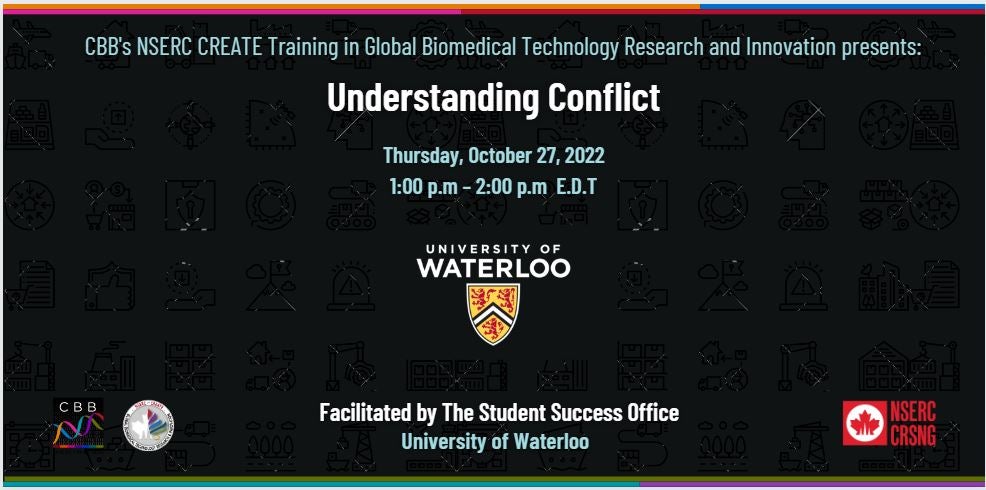
Understanding Team Conflict – Facilitated by The Student Success Office, University of Waterloo. In this workshop, trainees will gain a better understanding of when and why different types of team conflict occur. They will learn adaptability and conflict resolution strategies designed to make them more productive when working in teams. [Module 2. Design Training; Interdisciplinary Collaboration].
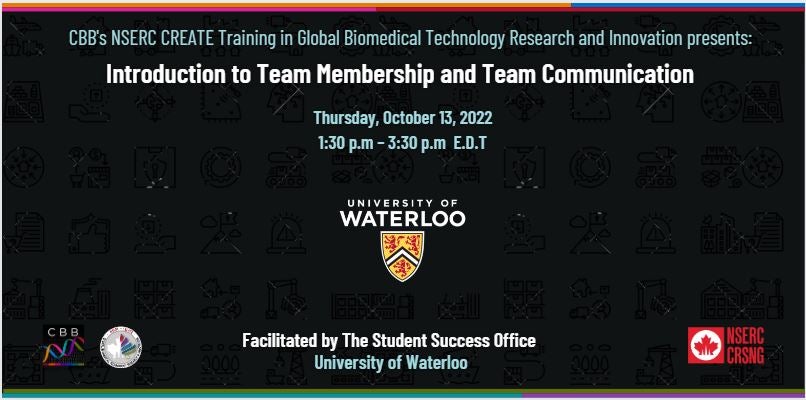
Introduction to Team Membership and Team Communication – Facilitated by The Student Success Office, University of Waterloo. The 1st hour of this workshop will focus on team membership where trainees will learn to manage team projects by developing Gantt Charts and Team Contracts. Shared Mental Models and backup behavior will also be discussed. These tools will help team members monitor the performance of self and team, allowing the team to operate more cohesively. In the 2nd hour, we will discuss team communication. Here, trainees will learn effective communication strategies that will enhance collaboration in team meetings and allow for better information exchange. Participants will also develop individual and team mental models that are designed to recognize similarities and differences among team members’ ideas and perspectives.
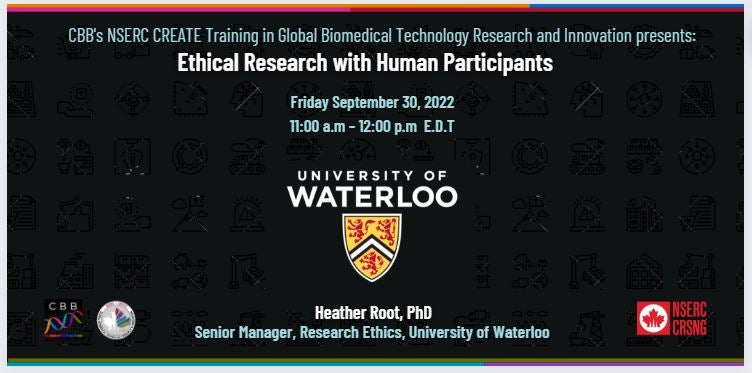
Ethical Research with Human Participants – Presented by Heather Root, PhD., Senior Manager, Research Ethics, University of Waterloo. This presentation will identify the core principals of ethical research design and discuss when ethics clearance is necessary. An overview of the ethics review process will be provided, and resources to help prepare an ethics application will be discussed. Additional available training will be introduced. The Responsible Conduct of Research framework and researcher's responsibilities will be reviewed.[Module 3. Biomedical Commercialization, Biomedical Ethics and Clinical Evaluations].
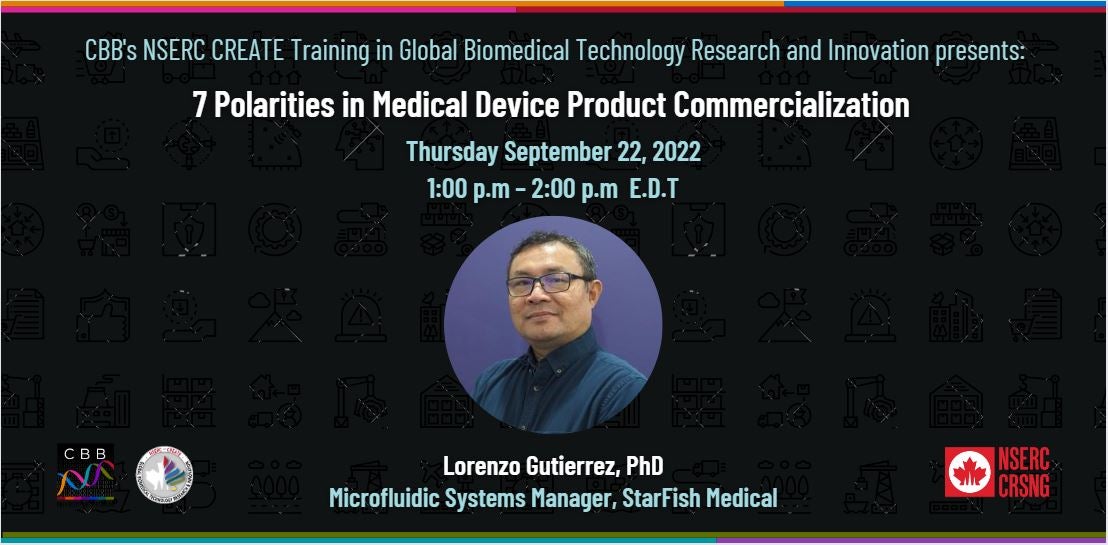
7 Polarities in Medical Device Product Commercialization – Presented by Lorenzo Gutierrez, PhD., Microfluidic Systems Manager, StarFish Medical. Polarity management is a technique for managing two opposing conditions. It is a type of management tool that honors opposing, seemingly conflicting values and finding a balance between them. In medical device development and commercialization, there are so many complex and seemingly unsolvable challenges or polarities. In this special lecture, Lorenzo Gutierrez will be discussing seven (7) polarities in medical device product commercialization which in the past became the source of conflict within the product development team and various stakeholders. Strategies for addressing dualities that will eventually drive effective actions will also be discussed.[Module 3. Biomedical Commercialization, Entrepreneurship and Commercialization].
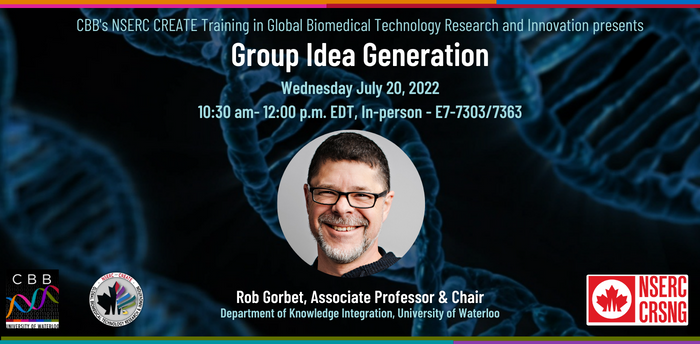
Group Idea Generation, presented by Rob Gorbet, PhD, PEng, Associate Professor & Chair, Department of Knowledge Integration, University of Waterloo. In this workshop, we will explore creativity during the divergent thinking process, and learn some techniques for generating new ideas and then building on ideas in a group.
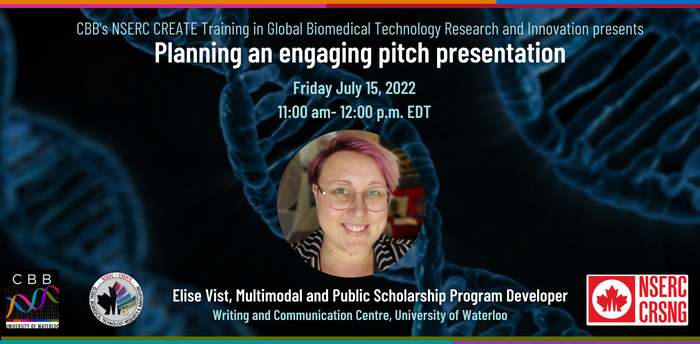
Planning an engaging pitch presentation. Presented by: Elise Vist, Multimodal and Public Scholarship Program Developer, Writing and Communication Centre, University of Waterloo. Topics include: the basic elements of a good pitch, planning and drafting your presentation, and designing memorable slides. [Module 4 – Professional Skills; Writing and Communications]
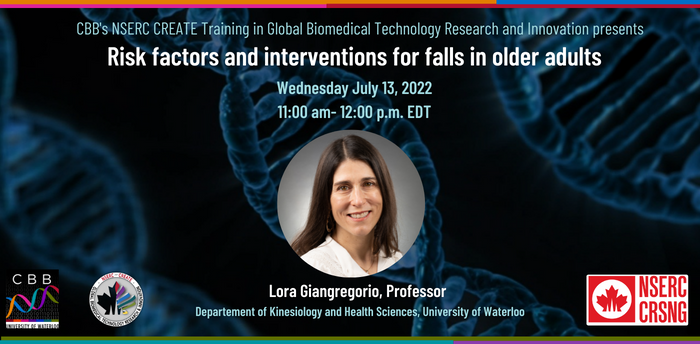
Risk factors and interventions for falls in older adults. Presented by: Lora Giangregorio, PhD, Professor and Schlegel Research Chair in Mobility and Aging, Department of Kinesiology and Health Sciences, University of Waterloo. Professor Giangregorio discussed the risk factors for falls in older adults, and what we know about interventions that are effective for preventing falls. [Module 2 – Design Training; Needs Finding and Assessment]

Mitigation of patient falls at Grand River Hospital - A CBB CREATE research project. Presented by: Nargess Heydari Beni, CREATE trainee and GRH intern, Ph.D. Candidate, Systems Design Engineering, Engineering Bionics Laboratory, University of Waterloo. Nargess Heydari-Beni presented the results of the project "Mitigation of Patient Falls at Grand River Hospital" including a list of needs that were derived from hosting focus groups with nurses and other healthcare professions. [Module 2 – Design Training; Needs Finding and Assessment]
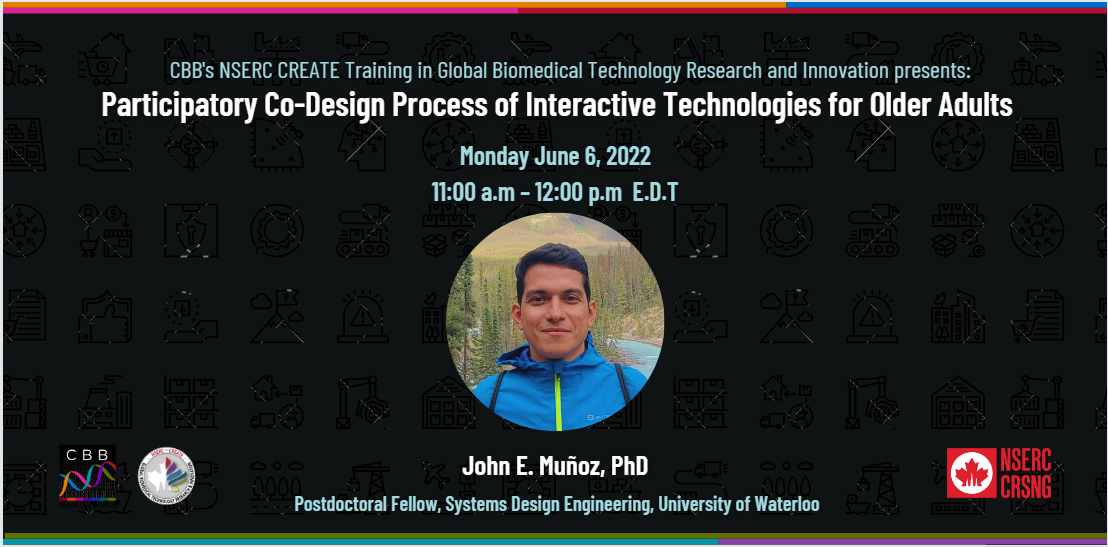
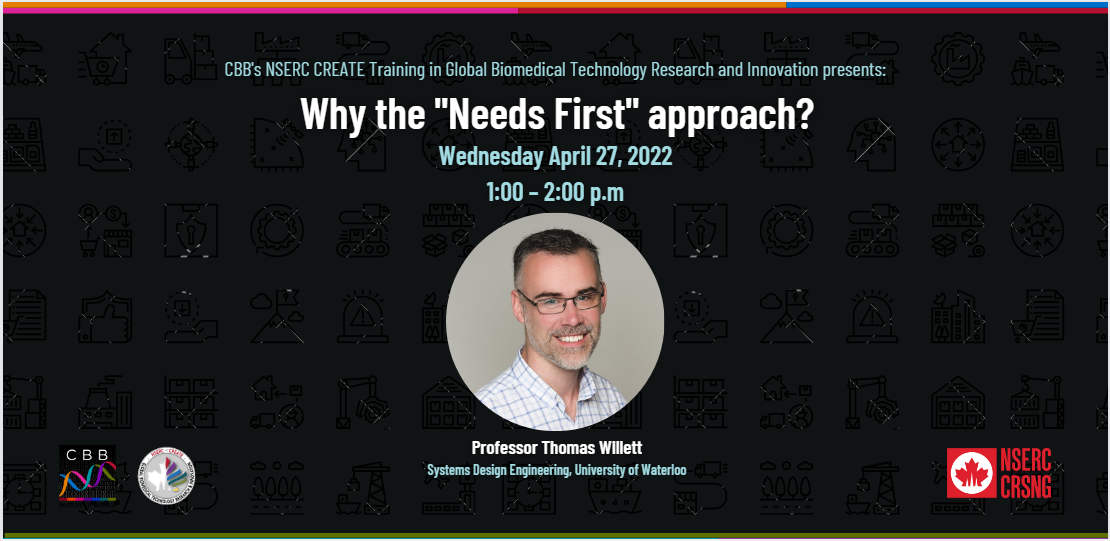
In this training session, Professor Willett led a discussion on the 'Needs First' philosophy, and provided trainees with an opportunity to consider/reconsider their thesis research from the 'Needs First' perspective. [Module 2. Design Training, Needs Finding & Assessment].
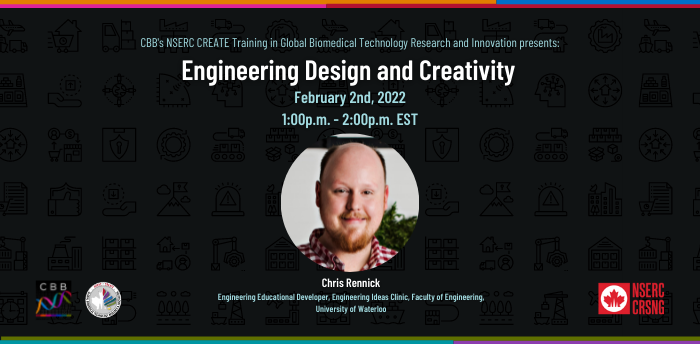
Webinar Presented by Chris Rennick, Engineering Educational Developer, Engineering Ideas Clinic, Faculty of Engineering, University of Waterloo.
This training session describes and connect theories of design and creativity to illuminate opportunities to boost innovation. With an understanding of how theories of creativity and design overlap, designers can think about targeted ways of improving their creative output. While there is no magic bullet to improving creativity, by examining it through the lens of cognitive skill development, it is possible to develop strategies to "deliberately practice" design and creativity. [Module 2 - Design Training, Concept Evaluation and Refinement].
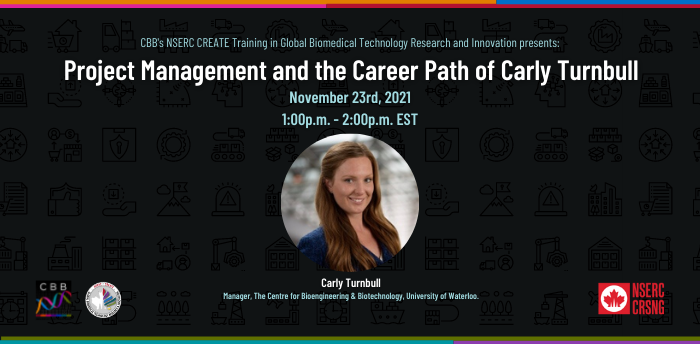
“Project
Management
and
the
Career
Path
of
Carly
Turnbull”–
Presented
by
Carly
Turnbull,
Manager,
The
Centre
for
Bioengineering
&
Biotechnology,
University
of
Waterloo.
In
this
webinar,
Carly
introduces
the
basics
of
Project
Management,
based
on
the
PMBOK
7th
Edition,
including
the
importance
of
communication
and
other
lessons
learned
during
her
certification
as
a
Project
Management
Professional.
She
outlines
her
personal
journey,
including
the
professional
milestones
in
her
life
and
the
thought
process
behind
the
direction
taken
at
each
crossroad. [Module
4.
Professional
Skills,
Project
Management]
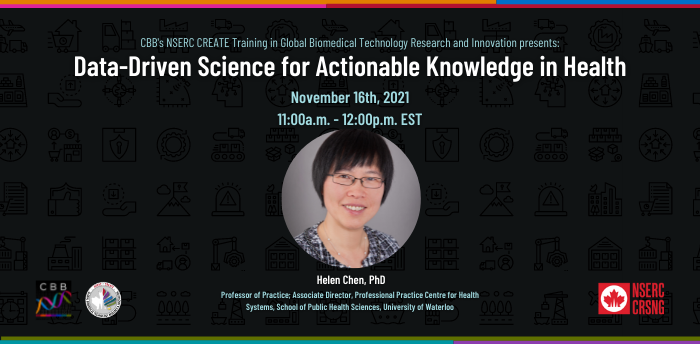
“Data-Driven
Science
for
Actionable
Knowledge
in
Health”
–
Presented
by
Helen
Chen,
PhD
Professor
of
Practice;
Associate
Director,
Professional
Practice
Centre
for
Health
Systems,
School
of
Public
Health
Sciences,
University
of
Waterloo.
This
webinar
explores
how
data
can
be
used
to
fight
disease
and
the
challenges
and
opportunities
of
providing
accessible
and
actionable
data
to
key
healthcare
stakeholders
including,
policymakers,
researchers,
care
providers,
and
patients.
[Module
3.
Biomedical
Commercialization,
Innovation
and
Challenges
in
Biomedical
Technologies].
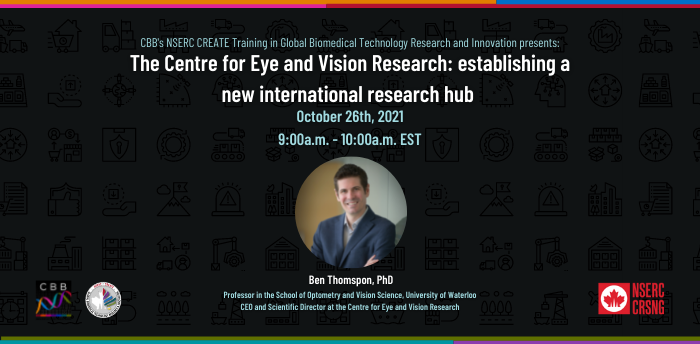
The
Centre
for
Eye
and
Vision
Research
establishing
a
new
international
research
hub,
Presented
by
Dr.
Ben
Thompson,
Professor,
School
of
Optometry
and
Vision
Science,
University
of
Waterloo
and
the
CEO
of
the
Centre
for
Eye
and
Vision
Research
(CEVR),
Hong
Kong.
Founded
in
Hong
Kong
in
2020,
the
Centre
for
Eye
and
Vision
Research
(CEVR)
is
a
collaboration
between
the
University
of
Waterloo
and
Hong
Kong
Polytechnic
University.
Professor
Thompson
discusses
the
Centre’s
founding,
its
ongoing
research
projects
and
the
numerous
postdoctoral
job
opportunities
that
are
available
at
the
centre. [Module
3.
Biomedical
Commercialization,
Innovation
and
Challenges
in
Biomedical
Technologies].
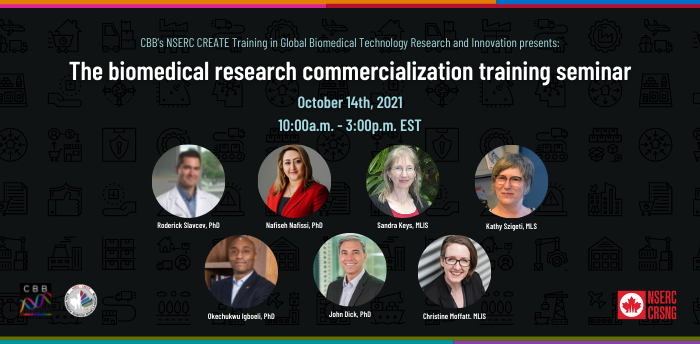
Finding problems and commercializing solutions with Velocity Campus, presented by John Dick, PhD and Christine Moffat [Module 3: Biomedical Commercialization; Entrepreneurship and Commercialization].
Finding patents and conducting market research, presented by Sandra Keys and Kathy Szigeti. Learn about patents, their place as intellectual property, and how to search for them. Learn how to conduct market research, including some of the tools and resources the Library has to offer to assist. [Module 3: Biomedical Commercialization; Entrepreneurship and Commercialization].
From industrious grad to industrial grade: An entrepreneurial and introspective workshop on translation of science from academia to industry. Presented by Roderick Slavcev, PhD and Nafiseh Nafissi, PhD. Learn how to translate health technologies and build effective business models for commercializing your research. [Module 3: Biomedical Commercialization; Innovation and Challenges in Biomedical Technologies].
Idea to market - fundamentals of turning ideas into viable products and services, by Okey Igboeli. Attendees will learn several key steps required for a successful entrepreneurial journey. Topics include: the fundamentals of idea generation, business model development, and product validation. [Module 3: Biomedical Commercialization; Entrepreneurship and Commercialization].
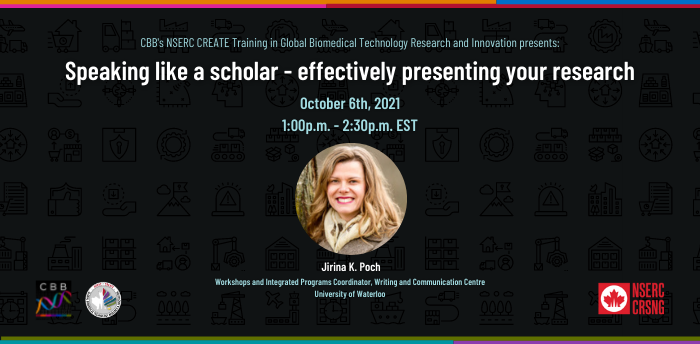
“Speaking like a Scholar - Effectively Presenting your Research” – Presented by Jirina Poch, Workshops and Integrated Programs Coordinator, Writing and Communication Centre, University of Waterloo. Learn how to present your ideas confidently and comfortably using an effective delivery style to interact with your audience. Get tips on enhancing your mental skills as a tool to enhance public speaking. [Module 4. Professional Skills, Writing and Communications].
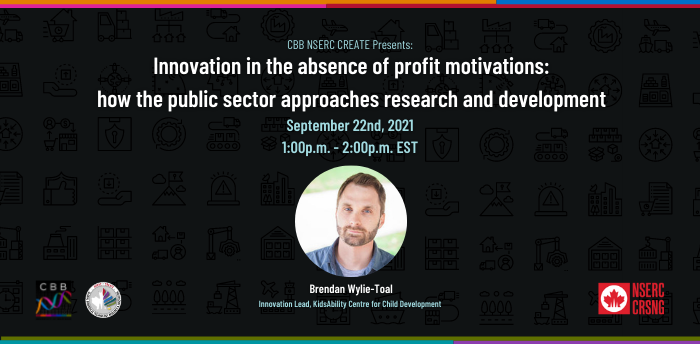
Webinar Presented by Brendan Wylie-Toal, Innovation Lead at KidsAbility. Open innovation is the process of engaging external sources of knowledge and capabilities in the pursuit of developing new products, services, and processes. The concept has been a source of active research, but there remains a need to better understand how it is approached in non-profit organizations who lack the financial motivations of for-profit firms. In this webinar, Brendan discusses his research involving the study of open innovation programs in non-profit healthcare organizations to obtain greater insight into the structure of the programs being run, the motivations for participating, and the role that the external sources of knowledge play in affecting innovation outcomes. [Module 3. Biomedical Commercialization, Innovation and Challenges in Biomedical Technologies].
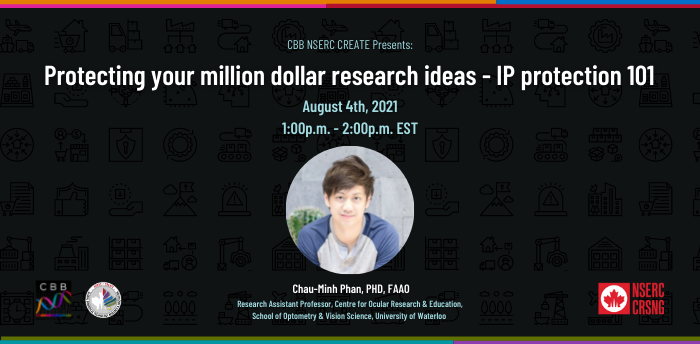
The thrill of academic research is that one day it could potentially lead to scientific breakthroughs. Learn how to protect your intellectual property (IP), how to patent your IP, what resources are available, and how to tailor your research towards generating new IP. [Module 3: Biomedical Commercialization, Entrepreneurship and Commercialization].
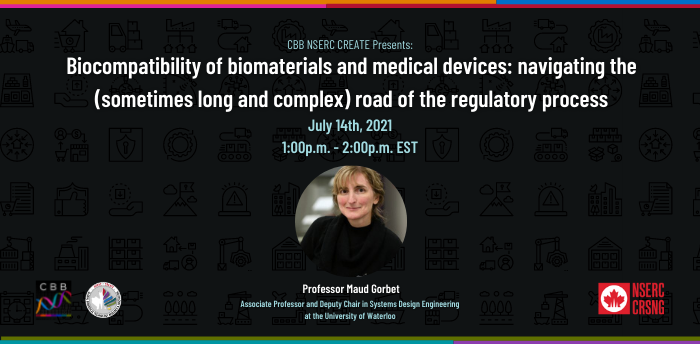
The webinar was presented by CREATE co-grantee, Professor Maud Gorbet who is an Associate Professor and the interim Deputy Chair in the Department of Systems Design Engineering (SYDE) at the University of Waterloo. This talk highlights elements of the regulatory process for biomaterials and important evaluation parameters to include during biomaterial development. [Module 3. Biomedical Commercialization, Regulatory Aspects and Standards]
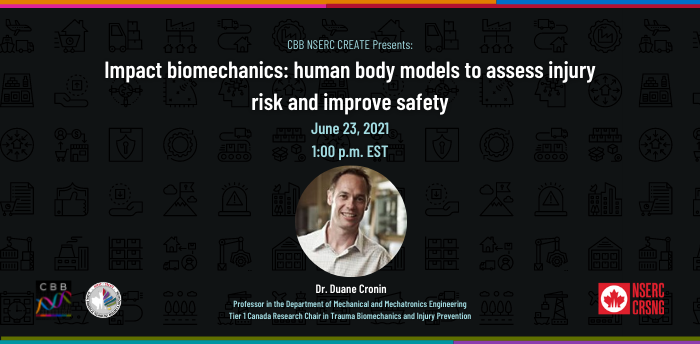
Impact Biomechanics: Human Body Models to Assess Injury Risk and Improve Safety. Impact Biomechanics is the study of traumatic injury to the human body resulting from impact scenarios, typically occurring over relatively short time intervals, for the purpose of improving safety or protection. In this presentation, an overview of methods to assess impact response and injury risk was presented, with a focus on contemporary finite element Human Body Models and the potential to assess injury at the tissue level. Examples of applications were presented.
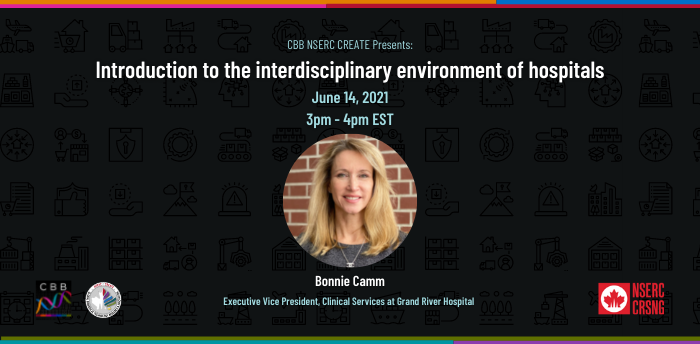
In this lecture, Bonnie Camm provided an overview of the health care structure in Ontario; highlighting processes and details regarding funding, patient flow, research and innovation, and more.
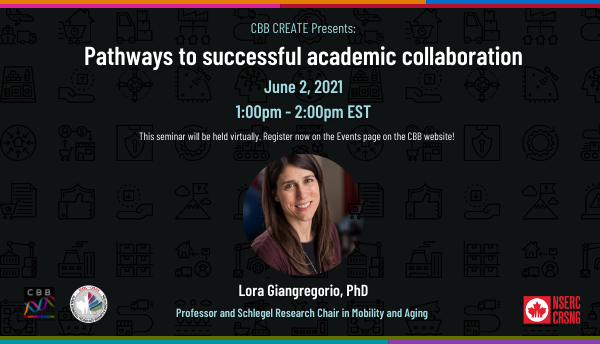
A needs first approach to research and technology development benefits from multidisciplinary and multisectoral collaboration. Learn who you can engage as collaborators, how to engage them, and at what stages of the research, with examples from our research program. Get insights on how collaboration can contribute to real-world contributions, friendships, and productivity. [Module 2: Design Training, Interdisciplinary Collaboration].
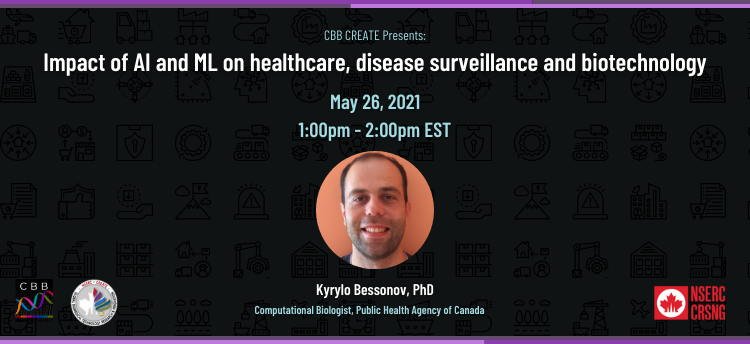
This webinar was presented by Dr. Kyrylo Bessonov who is a computational biologist in the National Microbiology Lab at the Public Health Agency of Canada. In his presentation, Dr. Bessonov describes current applications of AI and ML in clinical practice, drug design/development and public health. Ethical considerations of big data and AI are also discussed. [Module 3: Biomedical Commercialization – Innovation and Challenges in Biomedical Technologies].